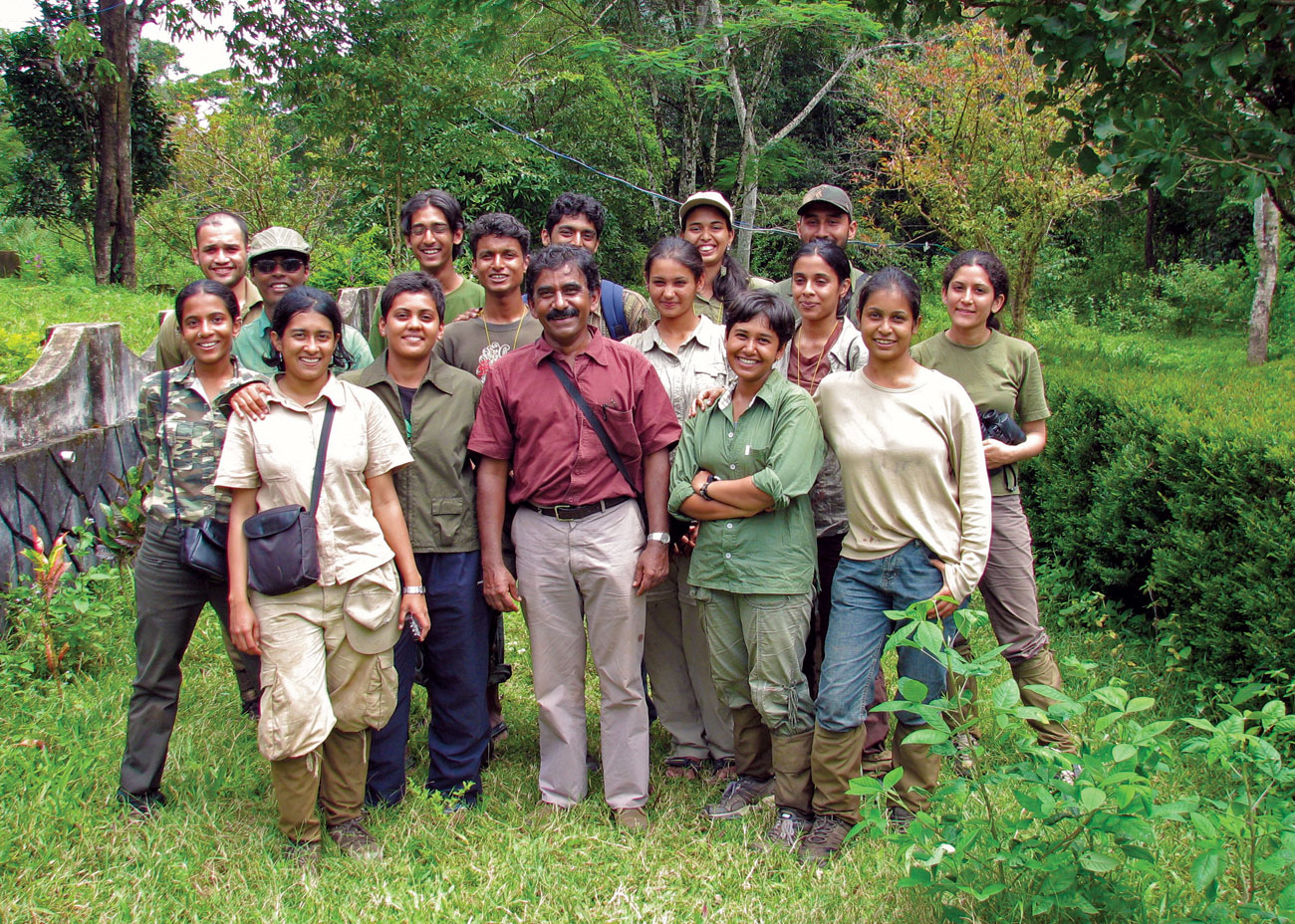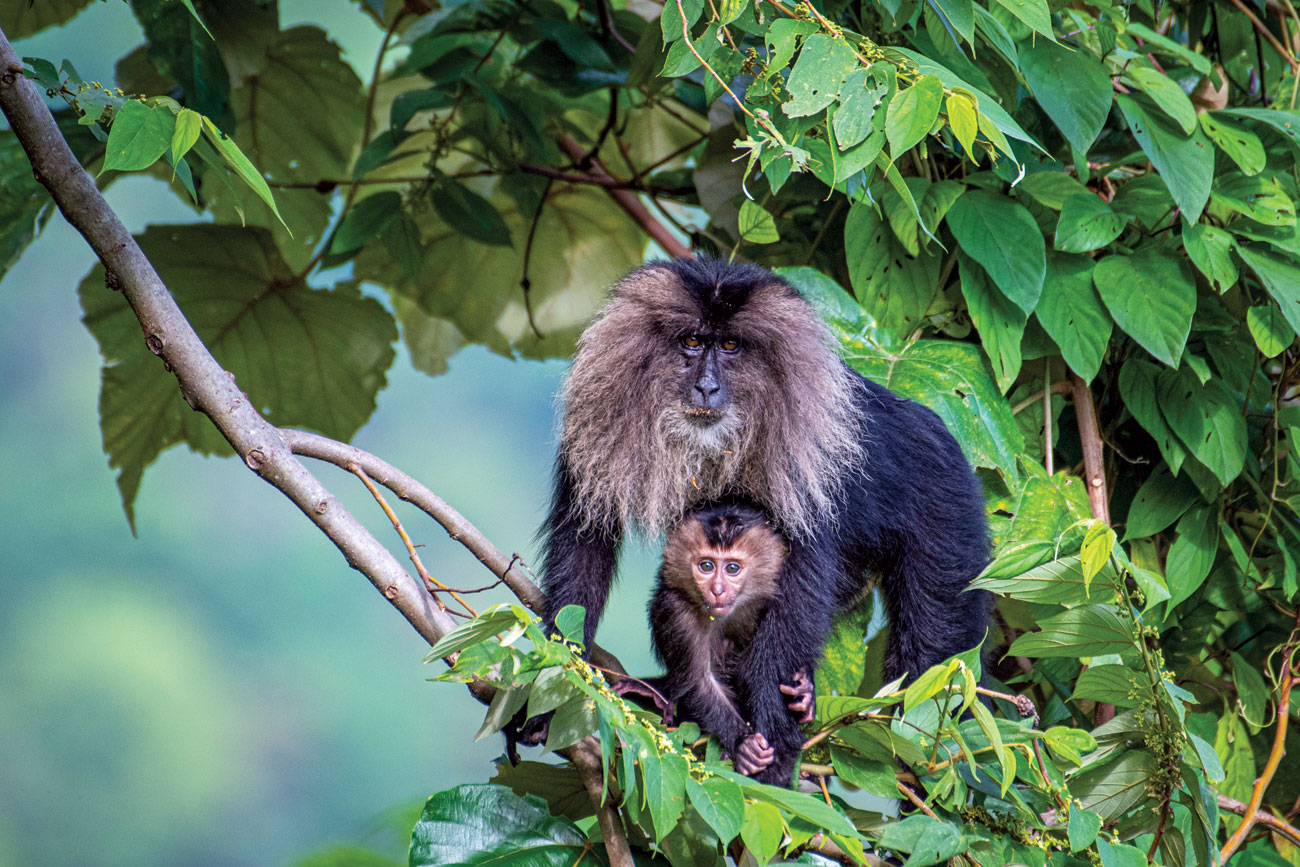Ajith Kumar: A Legacy That Lives On (1953-2025)
First published in Sanctuary Asia,
Vol. 45
No. 4,
April 2025
By Nandini Dias Velho and Divya Karnad
Dr. Ajith Kumar was an eminent Indian wildlife biologist and educator, whose work is foundational to primate ecology in India. We will remember him not only as a mentor and researcher, but a humble man with an irreverent sense of humour, and a deep love for the wild – both from the natural world and the student world.
All the way from the Western Ghats, a letter was sent with the envelope simply reading: Prince Charles, Buckingham Palace. Miraculously, the letter reached the British Royal, and Dr. Ajith Kumar completed his Ph.D. in the Anamalais with a scholarship from Prince Charles. The nearest post office was 26 km. away, so when a postman trudged all the way to Varagaliar with a response from Prince Charles, he expected to meet some high-ranking, formal-looking person. Instead, he found lungi-clad Ajith, grinning, knee-deep in his meticulous observations of lion-tailed macaques.
Ajith’s research is foundational to primate ecology in India. He studied the diet of lion-tailed macaques, their delayed maturation, and long inter-birth intervals. This work paved the way for his deep love and understanding of another set of primates – his students. Putting his own research aside, he enabled work by colleagues and students from the Himalaya all the way to the Indian Ocean. His characteristic response to our awe at the legendary story of his letter to Prince Charles was simple: “Just ask for money for the work you want to do.” When we prodded him to revisit his Ph.D. and write a long-overdue book, he joked that his creative energies were better spent writing yet another recommendation letter for someone. On July 1, 2020, when he officially retired, he declared that he would spend his days writing recommendation letters and helping us complete papers and unfinished theses, which became something he did for over 20 years. Dr. Jagdish Krishnaswamy, his colleague and close friend, often recalled Ajith’s philosophy: research papers might one day be replaced, but students, nurtured with care, carry a longer legacy.

Dr. Ajith Kumar was a beloved mentor to hundreds of students throughout the years, inspiring countless individuals with his knowledge, passion, and dedication. Photo: Kamala Hassan.
Another one of Ajith’s characteristics was his lack of self-importance and his pride in collective action. Whether it was students coming together to put on a unique musical play or ecologists getting together at the Indian Wildlife Ecology Conference, putting aside their differences, institutes, and organisations, Ajith worked tirelessly behind the scenes, nudging people together, for over three decades. His accomplishment came from the fact that his students were chairing conference sessions, panels, and were also co-organisers. When one of his students, with supporting recommendations from Ajith, began working with the Minister for Environment and Forests of India, in a rare moment, he shared that he was beaming with pride at her work. But he also knew when to bring things to an end. A few months later, he wrote to the Minister to advise him to relieve the student from her duties, as she had secured full Ph.D. funding, and insisted she must start her Ph.D. without delay. His advice was that power comes, and power goes – wisdom we are now grateful for!
Ajith’s philosophy in life was to enjoy the simple things. This meant finding the wild spaces that brought peace, along with good company, food and drink. This mantra also extended to his work. He would challenge us to question the necessity of convoluted statistical methods, reminding us that sometimes, clear-eyed field observations spoke louder than any complex model. His favourite example was research that employed elaborate statistics to conclude the fairly obvious – that chital and nilgai preferred open areas while sambar favoured the woods.
But simplicity never meant boredom. Spotlighting plants and identifying them, even at night, was fair game. He’d trick us into tasting bitter leaves or quiz us until we confused even the most common tree species. The joy he found in noticing everything was contagious. In the forests of the Periyar Tiger Reserve, any teacher attempting to lead the group away from Ajith was foiled. While they may have been focussed on demonstrating the diversity of birds, insects or fish, the students followed Ajith on his quest for a glimpse of his beloved lion-tailed macaques.
His irreverent humour was unmissable. Dr. Robin Abraham recalls Ajith’s opening lecture on mammals; it featured none other than George Bush cradling George Bush Jr. as a ‘bush-baby’! Uttara Mendiratta recalls pulling an all-nighter to finish her thesis, only to find her document mischievously edited – her study species the Arunachal macaque Macaca munzala, had been cheekily renamed Macaca masala by none other than Ajith, her thesis supervisor.
Once during a class rebellion against Dr. Rauf Ali’s daunting assignment of reading 50 papers in two days, Ajith jauntily walked in for an impromptu session on ‘How to read papers'. “First the abstract,” he advised, “then the discussion. Only then decide if it’s worth trudging through the methods.” And with his characteristic smile, he left us wondering whether he’d made things simpler – with his main motive being to disappear for a leisurely evening of hanging out with Rauf.

Ajith’s research is foundational to primate ecology in India. He studied the diet of lion-tailed macaques, their delayed maturation, and long inter-birth intervals. Photo: Vivek Sudhakaran/Sanctuary Pphotolibrary.
On March 1, 2025, Ajith passed away in Pachmarhi with binoculars and camera in hand, surrounded by students and friends. Dr. Kulbhushansingh Suryawanshi consoled us to say it was an honour to be with him in his final moments. A generation of Ajith’s students will smile at the memories of one of his favourite sayings: “All that is okay, but where is your paper?” His beloved lion-tailed macaques will continue to be studied by his students, such as Dr. G. Umapathy and Dr. Swapna Nelaballi; the latter of the two had just co-written a proposal to study these macaques with Ajith himself. Generations of people will continue to be inspired by Ajith’s work. Kiran Rahalkar fondly remembers one of Ajith’s sayings for the tough times, “Such is life.”
Ajith’s was an extraordinary life, filled with support, guidance, and mentorship for others, day after day. We remember Ajith, not just as a scientist or a teacher, but as someone who made us pay attention – to the forests, to the plants, the animals, and most importantly, to each other.
While we often celebrated with Ajith, perhaps we never knew how to celebrate Ajith while he was alive. He gave so much with such little expectation of any returns. Wherever we go and whatever we do, there will always be a little bit of Ajith’s magic in it.
Dr. Nandini Dias Velho and Dr. Divya Karnad are alumni from the second batch of the National Centre for Biological Sciences based Masters Programme in Wildlife Biology and Conservation.



